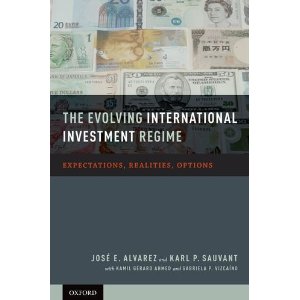The Evolving International Investment Regime: Expectations, Realities, Options
Edited by José E. Alvarez and Karl P. Sauvant with Kamil Gérard Ahmed and Gabriela P. Vizcaíno (New York: Oxford University Press, 2011).
 The transboundary flow of capital directed at establishing businesses is the engine of the world economy. Approximately 3000 bilateral and regional investment protection treaties worldwide govern this driver of economic globalization. As might be expected, the international investment regime now competes with the World Trade Organization for global praise and criticism. This volume looks at how these treaties and investor-state arbitrations that apply them accommodate the different expectations of various stockholders, including governments, foreign investors and civil society. The volume’s diverse authors focus especially on the views of developing countries and international civil society. They address the extent to which the regime is satisfying the expectations of those who originally drafted the treaties as well as the states now at the losing end of investor-state awards. They review critiques of the regime that help explain sovereign and political backlash, identify avenues for accommodating various interests, and make specific proposals to address concrete challenges. The volume should interest academics, practitioners, negotiators of international investment agreements, and others who want to know more about the rules that govern foreign direct investment, the activities of multinational enterprises, and those who seek to advance sustainable economic development through both.
The transboundary flow of capital directed at establishing businesses is the engine of the world economy. Approximately 3000 bilateral and regional investment protection treaties worldwide govern this driver of economic globalization. As might be expected, the international investment regime now competes with the World Trade Organization for global praise and criticism. This volume looks at how these treaties and investor-state arbitrations that apply them accommodate the different expectations of various stockholders, including governments, foreign investors and civil society. The volume’s diverse authors focus especially on the views of developing countries and international civil society. They address the extent to which the regime is satisfying the expectations of those who originally drafted the treaties as well as the states now at the losing end of investor-state awards. They review critiques of the regime that help explain sovereign and political backlash, identify avenues for accommodating various interests, and make specific proposals to address concrete challenges. The volume should interest academics, practitioners, negotiators of international investment agreements, and others who want to know more about the rules that govern foreign direct investment, the activities of multinational enterprises, and those who seek to advance sustainable economic development through both.
View the front matter and introduction for this volume.



